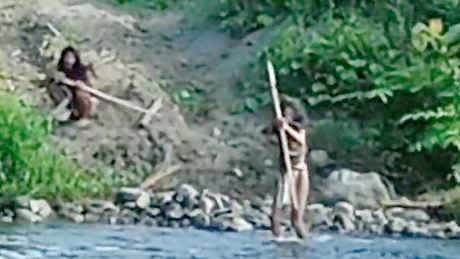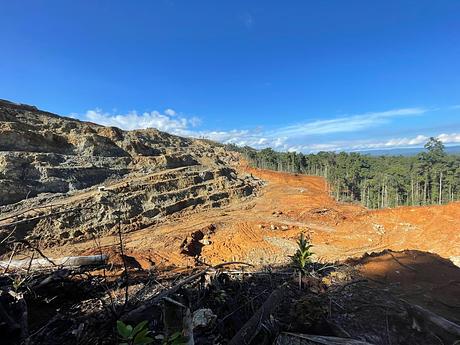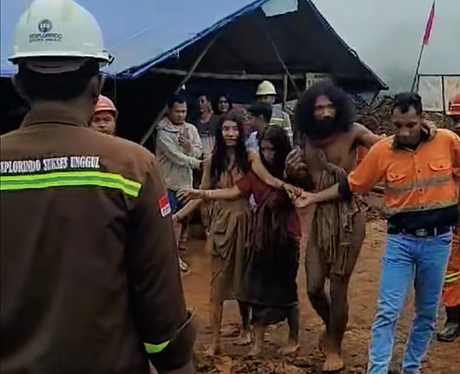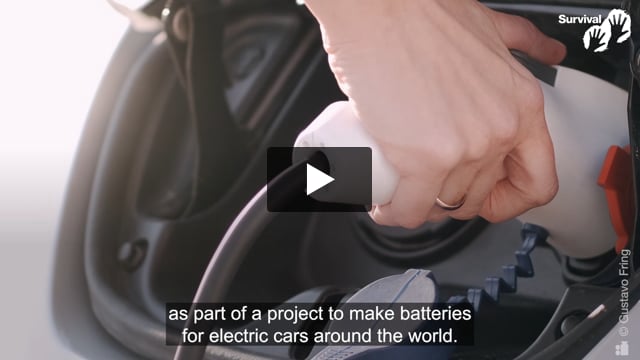Indonesian Senate Leader: Protect uncontacted tribe from nickel mining
June 7, 2024
 © Anon
© AnonOne of the most senior politicians in Indonesia has said the government should protect an uncontacted tribe whose territory is being destroyed for the world’s largest nickel mine.
Senate Leader AA LaNyalla Mahmud Mattalitti, a close ally of President-elect Prabowo, said Hongana Manyawa people should be protected from nickel mining on their land. He urged the government to “immediately intervene to provide protection to the indigenous tribe.”
Up to 500 uncontacted Hongana Manyawa people live on Halmahera island, about 1,500 miles NW of Jakarta. They refuse interactions with outsiders and rely entirely on their rainforest for survival. Contact with outsiders can kill them through exposure to diseases to which they have no immunity. Their rainforest home sits on huge deposits of nickel and is being torn apart for mining. One of those mines – the largest nickel mine in the world – is run by Weda Bay Nickel, attracted by the global boom in nickel for electric car batteries.

Indonesia’s 1945 Constitution specifically recognizes the protection of Indigenous tribes, LaNyalla said. He added that it’s vital to ensure the Hongana Manyawa can be “independent over all matters relating to their livelihoods." He called on Halmahera’s North Maluku provincial government to revisit their land planning regulations to ensure the Hongana Manyawa would no longer be displaced by mining.
LaNyalla’s comments were prompted by the viral spread of a video showing uncontacted Hongana Manyawa people forced by the destruction of their rainforest home to beg for food from Weda Bay Nickel miners – the very people responsible for that destruction.
 © Survival
© Survival
The mining operations are run by French company Eramet, which has known about the presence of uncontacted Hongana Manyawa in their concession since 2013, yet continues to mine on their territories regardless.
This is believed to be the first time the plight of the uncontacted Hongana Manyawa has received the direct attention of the Indonesian central government. LaNyalla’s comments also follow Tesla’s recent announcement that the company is exploring the need for a mining no-go zone to protect the rights and territories of uncontacted Indigenous people in Indonesia. Tesla included the statement in its 2023 Impact Report, issued in May, after Survival International supporters sent more than 20,000 emails to electric vehicle companies, mining companies and the Indonesian government calling for a mining no-go-zone.
LaNyalla said: “Whatever form it takes, I ask that development does not displace the surrounding communities, especially the indigenous tribe who lives in the interior, where they depend on the forest.” There’s not much time. The recent video reveals the rapid destruction of the Hongana Manyawa’s rainforest home.
Survival’s Director Caroline Pearce said: “This is an unprecedented announcement and offers a lifeline to the uncontacted Hongana Manyawa. The solution is clear: Their territory must be protected and must be free from mining and other developments. Eramet and other companies must abide by international law and stop mining on these territories, where they clearly have no consent.”
Survival calls upon local and national governments in Indonesia to urgently demarcate and protect the territory of the uncontacted Hongana Manyawa and establish a no-go zone to protect them against the catastrophic effects of mining and forced contact.
Caroline Pearce said: “Time is ticking for the uncontacted Hongana Manyawa. Their territory must be urgently protected, with a no-go-zone established before it’s too late.”
Note to editors:
1. Out of a total population of approximately 3,000 Hongana Manyawa people, between 300 and 500 are uncontacted, and could be wiped out. Mining destroys their rainforest home, and the mine workers bring diseases for which the uncontacted people have no immunity.
2. Survival is calling on all electric vehicle companies, including BMW, Volkswagen, and BYD, to commit to not source any materials from uncontacted tribes’ territories and for Tesla to make this their formal policy.



